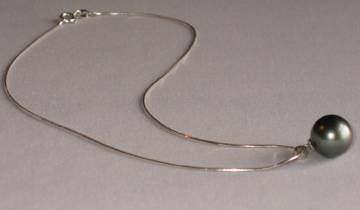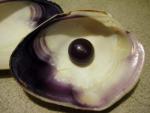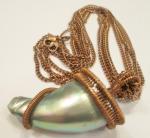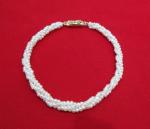|
Tahitian PearlsLearn more about Tahitian pearls.
 Black Tahitian Gem
Ever heard of the Tuamotu Archipelago? 950 miles from Tahiti, this string of two mountainous islands and 76 atolls (a ring shaped coral island reef enclosing or partly enclosing a lagoon) provide excellent natural breeding ground for the Pinctada margaritifera, the black-lipped pearl oyster.
Here, Robert Wan, owner of Perles Tahiti and known in the area as King of Pearls, maintains Tahitian pearl farms.
He says, “This black pearl oyster of ours is four times the size of the Japanese akoya pearl oyster.” And, unlike most Japanese oysters, which are bred artificially in a hatchery, Wan’s oysters spawn naturally in the atoll lagoons and the pinhead-sized larvae are “caught” by plastic garlands, growing quickly into small oysters. When the lagoon’s temperature falls below the ideal 75 degrees, the oysters suffer and decline, but at six months they are caged in baskets and allowed to grow for eighteen months. At this stage, a bead from an American freshwater mussel along with a piece of mantle tissue is inserted the mussel. (...surprising isn't it? That our mighty Mississippi helps the world culture Tahitian pearls. After much research and trial and error, these types of shells have performed the best.)
As in America, around the turn of the century, when the mussel shells were harvested for the mother of pearl…so mussels ware harvested here. Back then, a pearl was an unexpected reward...now they are the cultivated crop. Three years after being implanted with mantle tissue and a shell bead…a black pearl can be harvested from each mussel. What makes black pearls so sought after? Some say it’s their rarity, thickness, size and especially their “orient,” or the reflection of light beneath the surface. Colors range from silver gray, obsidian, even white and green, (peacocks) which Wan raises in the cooler waters of the Gambier Islands to the south of the Tuamotu Archipelago. In 1996 French Polynesia send abroad a million pearls worth 140 million dollars. While half came from Wan’s farms, another 500 farms, of various sizes, even one boat farms, exported the rest. After the May harvest, there are thousands of Tahitian black pearls to grade for quality and export mostly to Japan and China, but also to over 36 other countries. However, there’s one Tahitian pearl that Wan will probably never part with…a huge beauty of 21 millimeters from his farm on Nengonengo. Read more about Perles de Tahiti (Pearls of Tahiti) and see stunning black pearl photos on their web site.
Tahiti has strict exporting rules, such as, since July 1, 2002, the thickness of nacre between the nucleus and external layer must be at least .8 mm. Pearls not fulfilling the requirement are considered rejects and exporting of rejects is illegal. On July 12, 2001, a standardized grading system was set in place for Tahitian pearls as follows: A--very good luster, with one visible flaw at most, distributed over less than 10% of the surface. B--good luster, has some slight flaws visible to the naked eye, and distributed on not more than 30% of the surface. C--medium luster, several slight flaws visible to the naked eye, over not more than 60% of the surface. D--either has a large amount of slight flaws over 60% of the surface at most, or several slight and deep flaws over 60% of the surface at most, regardless of luster.
|











